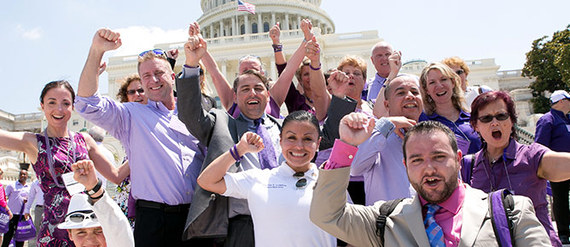Pancreatic cancer surpassed breast cancer this year to become the third leading cause of cancer-related death in the United States.
Of the 53,070 Americans who will be diagnosed with pancreatic cancer this year, many will be advanced-stage because there are no early detection methods. And with limited effective treatment options, most will not survive.
In fact, if you are diagnosed with pancreatic cancer today, you only have an 8 percent chance of living five years.
My father, Jim Fleshman, was one of those countless patients who became a devastating statistic. At age 52 and just four months after diagnosis, he died.
Progress may at times seem impossible - but much of our world's history has been doing what we once thought was impossible. However, when people raise their voices and take action, the impossible becomes possible. Certain types of breast cancer and AIDS are not considered a death sentence today because advocates stood up and made these diseases a national priority.
It's now time to make the impossible possible for pancreatic cancer and for patients like 35-year-old Elizabeth Jurcik.
Jurcik remembers her father, a gastroenterologist, telling her, with tears in his eyes, how difficult it was to tell his patients they had pancreatic cancer. He would urge them to make the most of their time - travel the world and spend time with family and friends.
Years later, when Jurcik was 31, she was ironically diagnosed with pancreatic cancer. But thankfully Jurcik wasn't told to get her affairs in order - her disease was caught early, and she was able to have surgery - an option many patients are not given because there is no effective early detection method for pancreatic cancer. Jurcik knows her story is different than most and feels fortunate to be alive to advocate for more research funding on behalf of the Pancreatic Cancer Action Network.
Thanks to the efforts of passionate volunteers and supporters like Jurcik, we are beginning to see real results and progress within the federal government.
On Jan. 2, 2013, the Recalcitrant Cancer Research Act was signed into law by President Barack Obama. The statute required the National Cancer Institute (NCI) to develop scientific frameworks for recalcitrant cancers, beginning with pancreatic and lung cancers.
The statute also defined recalcitrant, or deadliest, cancers as those cancers with a five-year survival rate below 50 percent. The passage of this bill would not have been possible without passionate advocates who demanded that Congress make these tough cancers a national priority.
And we cannot forget the significance of the National Cancer Moonshot Initiative spearheaded this year by Vice President Joe Biden. The goal of the initiative is to double the rate of cancer progress and to make a decade worth of advances in five years. This aggressive goal mirrors the goal made by the Pancreatic Cancer Action Network many years ago to double pancreatic cancer survival by 2020.
So, momentum is building. But more must be done.
Today, nearly 700 pancreatic cancer advocates, including over 100 survivors, will join me on Capitol Hill to urge Congress to increase federal funding for cancer research.
While we advocate on the Hill, thousands of supporters from across the nation will call their members of Congress, as part of our National Call-in, to make these same asks. Please join us in this national effort.
Together we will urge Congress to put the National Institutes of Health (NIH) on a path to sustained growth by appropriating $34.5 billion for the NIH, including $5.9 billion for the NCI, so that we can fully fund the Cancer Moonshot Initiative and make progress on our nation's deadliest cancers.
There is much to be proud of and so much progress on the horizon. But to double survival by 2020 and ensure Congress continues to make cancer research funding a priority, we need even more committed individuals with a fierce passion for tackling pancreatic cancer, the deadliest major cancer.
Please take two minutes today to join our National Call-in.
In loving memory of my dad and the countless dads, moms, sisters, brothers, children and other loved ones lost to this disease or who are fighting it today, let's make the impossible possible.
Julie Fleshman, JD, MBA, serves as president and CEO of the Pancreatic Cancer Action Network, the national organization creating hope in a comprehensive way through research, patient support, community outreach and advocacy for a cure.

